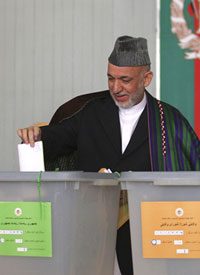
With more than 60 percent of the votes tallied from Afghanistan’s August 20 presidential election, incumbent President Hamid Karzai had received 47 percent of the vote as of September 2, still short of the 50 percent required to avoid a runoff. Karzai’s leading challenger, former Foreign Minister Abdullah Abdullah, has received 33 percent.
The Afghan Independent Election Commission, whose hed is a Karzai appointee, is due to announce the election result on September 17.
However, the Middle East-based Al Jazeera news organ observed that the country’s election commission reported that it is investigating more than 2,500 complaints, including allegations of voter intimidation and large-scale ballot-stuffing, which it must investigate before final results can be announced.
The allegations, along with low turnout due to violence in the south, could rob the election of its legitimacy and compromise the position of the United States and NATO allies that have staked their Afghan policies on support for a credible, popularly elected government with the power and legitimacy to combat the Taliban, widespread corruption, and the country’s immense drug trade.
An article in the British Guardian newspaper for September 2 reported on statements emanating from British officials that questioned the credibility of the Afghan election process and had already suggested that a runoff was inevitable.
Ed Davey, the British Liberal Democrat party’s foreign affairs spokesman, has called for a run-off, saying:
No one expected western-style elections. but the scale of fraud seems so large, and the likely margin of Karzai’s victory so small, that these results cannot be safely seen as a victory for Karzai. If Karzai is confident he has won in the first round by fair means he should have nothing to fear from a second round of voting that can ensure the winner has the support of the people of Afghanistan.
Another political leader, Greg Pope, a member of the foreign affairs select committee of Britain’s Labour Party, said: "The point of British forces being in Afghanistan is that there is a free, stable, and democratic country."
The Guardian reported that Conservative sources also said they were disturbed by the fraud claims, quoting one party member who said: "A narrow Karzai victory in which he claims more than 50 percent of a bogus vote is the worst of all worlds."
A September 2 report from CNN observed that "the vote count — like the election itself — is taking place in the shadow of persistent violence, with militant attacks and fighting between NATO-led forces and the Taliban."
AFP reported that Afghanistan’s Electoral Complaints Commission (ECC) has announced that it would accept no more allegations of misconduct, apparently because it is already overwhelmed investigating more than 2,600 complaints of election fraud.
The number of complaints include more than 650 which are serious enough to potentially affect the final result, the commission’s spokesman Ahmad Muslim Khuram told AFP.
As vote counting in Afghanistan progresses, a group of more than 25 international envoys is meeting in Paris to discuss ways to help stabilize Afghanistan. VOA news reported that the group, which includes U.S. envoy Richard Holbrooke, is expected to discuss the Afghan election, among other issues. Before the meeting, Holbrooke said it does not matter to the United States if there is a runoff to decide the winner of the presidential race. He said the U.S. is more concerned about whether the voting process was fair. "We have no candidates and no preference as to a first round victory or a run-off," Holbrooke told reporters.
VOA cited a New York Times report that quoted Delaga Barits, the governor of Shorbak district, as saying that Barits tribesmen in the area had decided to endorse Abdullah. But, the governor said, aides to Karzai’s brother, Ahmed Wali, who happens to be the leader of the Kandahar provincial council, shut down all of the district’s 45 polling sites on election day.
The governor and other tribal leaders claim that almost 24,000 ballots were shipped to Kabul from Shorback district, despite no one being allowed to vote.
The report notes that Mr. Karzai and his aides deny any wrongdoing.
NATO’s top official says the alliance’s mission will not be affected by the election outcome. Secretary-General Anders Fogh Rasmussen says that NATO did not deploy more than 60,000 troops to the region simply to support the electoral process.
Afghanistan’s attempts to overcome entrenched corruption to hold a fair and "democratic" election are but the latest challenge for a nation that has yet to master the art of self government. However, voices questioning whether setting Afghanistan on track is any of their concern are being heard with more frequency in the two nations that have supplied most of the NATO forces: the United States and Great Britain.
A poll released on September 1 by CNN and Opinion Research Corporation (PDF) showed in increase in opposition to the war in Afghanistan among Americans. The same poll taken a month ago indicated 54 percent of Americans opposed the war, but the number for the latest poll rose to 57 percent.



